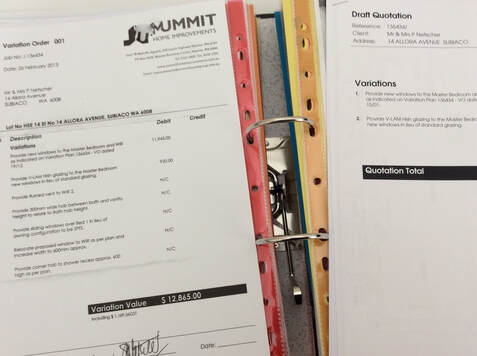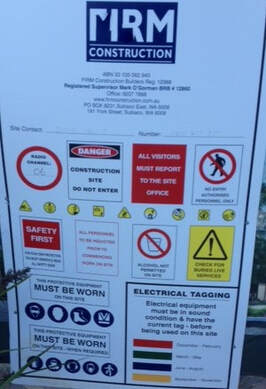Construction projects will have changesConstruction projects, no matter how well they are managed, will inevitably have delays, variations and changes which aren’t due to a fault of the contractor and couldn’t have been expected, allowed for or mitigated by the contractor. Most contract documents allow the contractor to claim the additional time and costs resulting from these events. Are you working for free on your construction project? What happens if clients do not pay for changes and delays which are no fault of the contractorUnfortunately some clients take the approach of not responding to contractor’s variation claims. This is often because the person administering the contract doesn’t want to raise the claim with their manager as it may reflect poorly on their project management skills. Other clients hope that by leaving the claim it may just go away, or that they can take all of the claims at the end of the project, put them in one basket and negotiate a once-off settlement with the contractor – a contractor who at that stage of the contract will be desperate just to get some money from their change order claims. Sometimes clients don’t agree to the contractor’s variation claims because they, in the meantime, are preparing a counter claim against the contractor which they’ll then use to offset the contractor’s claims. This approach is dishonest. Unfortunately most construction contracts specify a time for the contractor to issue a variation claim but very few specify a time by when the client has to respond to the contractor’s claims. This approach is unfair to the contractor since if the claim isn’t approved it won’t be paid, which disrupts the contractor’s cash flow. It also leaves them in limbo not knowing if they’ll be paid at all for the work, which means they could be facing a project loss, which could, in the case of large claims, have a devastating impact on the company. Furthermore, unresolved extension of time claims may mean that the contractor doesn’t complete the project within the original approved time period, thus allowing the client to impose damages or penalties for the late completion. How unfair is that? The contractor has a legitimate extension of time claim and they not only aren’t paid for their costs they incurred as a result of this claim, but, they are further penalized by having to pay damages – all because the client hasn’t responded to their claim! This puts the contractor in a quandary and they aren’t sure if they should accelerate the work (if that’s possible), thus incurring additional costs, but possibly completing the project within the original time and thus avoiding penalties. Of course the contractor hasn’t been instructed to accelerate so they possibly won’t be paid these acceleration costs. It’s important if the contractor decides to accelerate to try and meet the original contract completion date that they advise the client in writing that they are accelerating because the client hasn’t responded to their extension of time claim and is still insisting that the contractor completes the project on the original completion date. This letter should clearly state that there will be additional costs. The contractor needs to keep note of all the additional costs for this acceleration and invoice the client monthly for them. Can I Claim for Additional Time on My Construction Project? Also, as long as claims aren’t resolved there is a risk that the client’s budget may be overspent when the claims are finally resolved which could result in the contractor not being paid for the claims when they are finally agreed. Furthermore, often later variations incurred on the construction project are dependent on attaining a resolution for an earlier claim. As long as the first claims aren’t resolved contractors have to base their later claims on the assumption that their first variation claims were unsuccessful. This becomes messy and when the first claims are eventually agreed it may require the later claims to be reworked taking the earlier delay claim into account, and resubmitted, which takes time and causes confusion. "An excellent, concise and very practical guide to successful claims process. This is a no nonsense approach that gets on with it." Contractors need to make every effort to get their client to resolve their variation claims as soon as possible.Contractors need to make every effort to get their client to resolve their variation claims as soon as possible. Obviously ensuring they have provided all of the supporting information when the claim is first presented is essential and, also, that all of the client’s questions are answered as speedily as possible. It helps if a list of variation claims is included at all project meetings with the client, showing those variation claims which are agreed and those which are still unapproved. This claims register is also an aid for the client so they can adequately monitor their project budget. Will your next construction variation claim be successful? Should the client be unresponsive to variation claims and change orders, letters asking for a resolution need to be submitted. Request a meeting with your client’s representative. In some instance you may be dealing with the client’s engineer or project manager and your client may not even be aware of the unresolved variation claims. In these instances, it may help to bring the problem to the attention of your client and ask for a resolution to the problem. If claims remain unresolved because they aren’t replied to it may be necessary to follow the dispute resolution process outlined in the contract document. 10 Tips To Submit Winning Variation Claims It can pay to consult an expert and get advice on the way forward. In some countries and states there are legal options available and contractors need to be aware of these. Often these options are time dependent and should be instituted as soon as it becomes apparent that the client is going to ignore variation claims. Declaring a dispute with the client over a claim that hasn’t been responded to, often results in a rapid response to the claim. It should be noted that the contractor isn’t entitled to stop work because the client hasn’t responded to a claim – to do so could mean that the contractor is in breach of contract which could allow the client to terminate the contract. Do not ignore unpaid change orders - take actionDon’t let variation claims go unresolved until the end of the construction project since you risk not being paid the claim. Negative cash flow – the death for many construction companies This article was first published on the ClockShark website - Get The Industries' #1 Time-Tracking AppRunning a field service or construction business takes coordination and a great team. With ClockShark you get the industries' #1 timesheet ap Learn more about Construction Project ManagementTo read more about the author’s books and find out where you can purchase them visit the pages on this website by clicking the links below: 'Successful Construction Project Management: The Practical Guide' 'Building a Successful Construction Company: The Practical Guide' 'Construction Claims: A Short Guide for Contractors' 'Construction Project Management: Tips and Insights' 'Construction Book reviews' To read more about the author visit the page 'Paul Netscher' Want to contact Paul Netscher please enter your details on 'Contacts' Find out how Paul Netscher can help you Order your books from Amazon Order your books from Amazon UK © 2016 This article is not to be reproduced for commercial purposes without written permission from the author. "A MUST Read for any Construction Professional to raise their game! "
0 Comments
Unfortunately far too many construction subcontractors end like this. Will you be one of these contractors?
Subbies squeezed from both sides....Read....  Image courtesy of Stuart Miles at FreeDigitalPhotos.net Image courtesy of Stuart Miles at FreeDigitalPhotos.net Why is good quality construction important? This seems an obvious question! Of course quality is important on our construction projects! But then why do we continually see projects completed which are poor quality? Is it because people:
Saving money is also a poor excuse as the cost of completing poor quality work is usually the same as doing the work correctly - but rectifying poor quality work results in additional costs. Why good quality construction is important Unfortunately our employees often don’t understand the importance of good quality work. They don’t take pride in their work. It is important that management doesn’t except poor quality and don’t walk past work that’s unacceptable. Equally important though is to acknowledge good quality work and compliment those that have produced good quality. Poor quality work costs money Rectifying poor quality work costs enormous amounts of money to repair and rectify. Various research papers have quoted figures of between 5% and 15% of project costs are caused by poor quality work. Not only is there the cost of repairing the defective work, but there are often the additional costs resulting from the delay to the project. Rectifying completed work often impacts adjacent items meaning that there’s usually more to fix than just the item that wasn’t acceptable in the first place. Clients are also entitled to deduct money for work that they can prove is not according to specifications or which is of an unacceptable quality. Poor quality work delays projects Rectifying defective work takes time and also takes resources away from other parts of the project. A project can’t be handed over until all of the defects and snags have been completed and rectified. Poor quality work loses customers Contractors are only as good as their last project. Poor quality work on one project can quickly destroy client relationships. News of poor quality work can swiftly spread to other potential customers. Poor quality work can become a newsworthy item. Social media can rapidly spread pictures of poor quality. Our completed projects are advertisements for our company. Poor quality work disrupts cash flow Usually contractors don’t get paid until the client is happy with the work and all snags or punch-list items have been completed. The non-completion of items can delay the release of retention monies as well as the release of bonds and sureties. Companies need to receive their money as soon as possible to pay their employees, suppliers and subcontractors. Disrupted cash flow can mean bills aren’t paid which will lead to unhappy employees, suppliers and subcontractors and even lead to bankruptcy. Poor quality work causes accidents There have been many cases of completed buildings and structures collapsing because the construction was done poorly. Reinforcing steel was omitted, the wrong strength concrete was utilised or inadequate foundations were constructed. These collapses can often be spectacular resulting in many deaths and feature prominently in the media. But even when poor quality work is discovered during construction the rectification work can involve hazardous demolitions. Sometimes reaching the defective item is difficult, especially when it is detected after access has been removed. Rectification work is often done in haste and could involve unsafe practices. Poor quality work harms the environment
I’m sure we’ve all seen the discarded rubble heaps on construction projects. Often this rubble is the result of poor quality work which has had to be demolished. All this detritus ultimately ends on the trash dumps. Materials and energy have been consumed to produce the poor quality product and more energy is consumed to bash it down so that the work can be redone correctly. All of which has a negative impact on the environment. Poor quality work can lead to employee unhappiness Poor quality work leads to defects. Unfortunately it’s often not the worker that produced the poor quality work who has to rectify the defect. We all hate cleaning up someone else’s mess! Those employees left to close out punch or snag lists aren’t usually very happy. Demolishing defective work can be demoralising for the team since most construction workers want to build things and see progress. An unhappy client isn’t a nice client to deal with. Clients that face a poor quality project can be difficult and cantankerous (and rightly so) and they often look for other faults. Poor quality work can make recruiting good people difficult Employees want to work for companies with a good reputation. Invariably companies that produce poor quality don’t have the best managers and skilled people. Youngsters want to work for a company where they’ll be taught by good people. Who wants to work for a company where you are going to be facing abusive clients unhappy with the quality of their project? Who wants to work for a company when your job may result in you going back to fix mistakes on other people’s projects? Working for a company with a poor reputation doesn’t look good on your CV. Good people are proud of their work. Poor quality work teaches bad habits When management accepts poor quality work this poor quality becomes the norm. The workers who have produced the poor quality work will invariably repeat that standard of work on other projects. Junior and new employees will assume the poor standard of work is acceptable and will assume it is standard practice in the company, and will repeat the same poor standard elsewhere. Poor Quality work leads to problems later Patching something often results in a weak point which can lead to a failure later. Many contractors are called back to projects during the defects liability period to repair items that weren’t constructed correctly in the beginning, or items that were ‘patched’ during construction and the repair wasn’t done properly so hasn’t lasted very long. Sometimes these poor repairs lead to other problems and impact other parts of the structure making the repair job even bigger and costlier than if the repair had been attended to properly in the first place. Poor quality work on one project negatively impacts other projects Often resources are meant to move onto other projects but are tied up fixing defective work and closing out snag or punch-list items. This has a knock-on effect on the next project that is left waiting for resources, which then delays that project. Conclusion There is no excuse for poor quality work. Indeed there are many reasons to produce good quality work. Our clients are paying us to produce a quality product that conforms to their specifications, their scope of works and their expectations. They would like to be proud of their new facility and have many years of use from it without the inconvenience of repairing defective workmanship. But as important, is that the completed project is an advertisement for your company. You should be proud of the completed project, and it should be one you are happy to show to your children. Your employees should be equally proud to be part of a successful and quality product. Why is good quality work important to you? This article is adapted from information in the author’s popular books: 'Successful Construction Project Management: The Practical Guide' and 'Building a Successful Construction Company: The Practical Guide'. 'Construction Claims: A Short Guide for Contractors' has just been published. These books are available on Amazon and other online book stores. Paul publishes articles regularly on LinkedIn and his website. Paul writes regular articles for other websites, gives lectures, mentors, and is available for podcasts and interviews. © 2017 This article is not to be reproduced for commercial purposes without written permission from the author. The dangers of alcohol and drugs on construction projectsThe use of drugs and excessive consumption of alcohol is a growing problem on construction projects. It can lead to:
What can we do? Don't let alcohol and drugs become a problem on your construction projectWe had one construction project where there were numerous instances of people arriving late for work, being absent without leave, as well as numerous safety incidents. Many of these incidents were probably related to the excessive consumption of alcohol after-hours, and, although there was a breathalyser on site, the tests were not administered correctly with few instances of people being found over the limit. Yet, as soon as we put a trained, responsible, person in charge of these tests, the number of staff found to be over the limit at first increased, but once employees realised they would be caught and removed from the project if they were over the limit, their numbers decreased and productivity, attendance and safety improved. To ensure that alcohol and drugs don't become a problem on your construction projects project managers should make sure that:
Make your construction project a safe and productive work placeConstruction work isn’t easy and many workers are absent for long periods of time from their family and work long hours. This could lead to workers turning to alcohol and drugs for recreation and comfort. Management needs to take a proactive and consistent approach from the start of the construction project to deter workers from being inebriated or drug impaired at the workplace. Have you found the use of drugs or alcohol a problem on your project? Has alcohol or drug consumption caused problems on your project? This article was first published on the ClockShark website - Get The Industries' #1 Time-Tracking AppRunning a field service or construction business takes coordination and a great team. With ClockShark you get the industries' #1 timesheet ap Learn more about Construction Project ManagementTo read more about the author’s books and find out where you can purchase them visit the pages on this website by clicking the links below:
'Successful Construction Project Management: The Practical Guide' 'Building a Successful Construction Company: The Practical Guide' 'Construction Claims: A Short Guide for Contractors' 'Construction Book reviews' To read more about the author visit the page 'Paul Netscher' Want to contact Paul Netscher please enter your details on 'Contacts' Find out how Paul Netscher can help you Order your books from Amazon Order your books from Amazon UK © 2016 This article is not to be reproduced for commercial purposes without written permission from the author. Read this great article on the BBC website The Hidden Strengths of Unloved Concrete
Why construction projects are delayed and when contractors can claim for these delays.Often construction projects are delayed. Sometimes the delay is due to the contractor – for instance poor planning, insufficient resources, or materials arriving late. Often the delay is due to weather which might include rain, wind and extreme temperatures, but weather events are normal and should be accounted for by the contractor. On occasion the delay is due to reasons that were specified in the contract document – such as the contractor having to work in and around the customer’s activities. Many times in this case the contractor has to recover the lost time at their own expense, as they either caused the delay themselves or they should have foreseen or known about the potential delays when they prepared and agreed to the project’s construction schedule. an introduction to construction variation claims video 8 - when you can not claim extension of time However, delays often happen for reasons outside the control of the contractor, that couldn’t have been reasonably anticipated or allowed for by the contractor. In these cases, and depending on the terms of the project’s contract, the contractor will need to claim an extension of time so that the project’s completion date is extended. Delays invariably result in the contractor incurring additional costs as they remain longer on the project. Finishing a project late may entitle the customer to claim damages from the contractor. Furthermore, finishing a project late without a valid, approved reason can be damaging to the contractor’s reputation. Understanding the real cost of delays on your construction project It’s therefore essential that contractors understand some of the reasons and causes that give them the right to claim an extension of time. An extension of time means that the project’s completion date is extended by the number of days approved in the claim. The contractor then can claim the additional costs associated with this longer approved construction period. Reasons for extension of time on construction projectsSome causes of construction project delays that entitle the contractor to submit an extension of time include: 1. The customer (or their designated representative) issues an instruction to stop work for reasons unrelated to the contractor. The Instruction may be due to the customer changing their design, or to allow the customer’s work, or the work of their contractors, to proceed. However, in some cases customers may issue an Instruction to the contractor to stop work because of a fault by the contractor such as; unsafe working conditions, poor quality work, or failure to obtain design approvals or the required construction permits and in these cases the contractor can’t claim an extension of time unless they can prove that the customer (or their representative) was wrong to stop the work and that the contractor was in fact compliant. 2. The customer provides construction information late. I’m sure we’ve all been on projects where the customer’s drawings have been issued late. If there’s an approved construction schedule the customer should know when information is required and there’s no excuse for it being issued late. An introduction to construction variation claims for construction project managers video 9 - What information and by when? 3. Late access. Often contractors are dependent on the customer providing access to the work area in accordance with the agreed construction schedule. Care should be taken when accepting access to a work area that the area is safe and that the area given to the contractor meets the specified dimensions and heights as laid out in the contract document. An introduction to construction variation claims for project managers video 7. What is access? 4. Changes in specification. This is something that contractors don’t always detect until it’s too late. Change in specifications often increases the price of items, but the items with the new specifications could also have longer manufacturing times. In some cases specifications are changed after items have been ordered which means that the original order has to be cancelled and new orders placed which can significantly delay projects. 5. Scope increases. Many projects increase in scope and contractors need to continually compare the actual scope with the scope they priced. Increased scope usually means we need more time to complete the project, or additional resources to complete it in the original time frame. 6. The customer’s activities cause delays. Sometimes the contract document includes customer activities and constraints that the contractor has to work around and accept. In these cases the construction schedule should take these impacts into account. However, often during the course of construction the customer introduces new constraints. Is your client delaying your construction project? 7. Additional quality tests and inspections. The customer’s quality managers, at times, can introduce additional tests or quality inspections which weren’t mentioned in the contract documents. These can add additional costs and cause delays. Some customers add in additional ‘hold’ or inspection points, or require 24 hour, or even 48 hour, notice periods for inspection which delay the project. 8. Late drawing or design approval. The construction schedule and contract document should stipulate the maximum turn around time for the customer and their representatives to approve the contractor’s drawings and designs. Some customers exceed the times specified and cause delays to the project. 9. The customer and their team don’t immediately respond to requests for information (RFI’s) and drawing queries. Unfortunately I’m sure we’ve all received drawings with missing or conflicting information. On occasion querying and receiving the corrected information can be a tedious and time consuming process which delays the project. 10. Customers’ not providing facilities and utilities in the required quantities and in the time they were obligated to supply them. 11. The customer’s other contractors impact and delay the contractor’s work. They may restrict access to the contractor’s work areas, damage completed work or hold-up the contractor’s work where they are required to interface with them. Even work outside the immediate work area could dramatically impact the contractor’s work blocking roads and access or interrupting the supply of water and power. 12. The customer revises drawings which require the contractor to redo work which is already completed, or the contractor has to re-order materials or equipment, thus delaying the project while the items are procured. 13. The customer changes the sequencing in the schedule because they want some sections of the project earlier and others later. 14. Unforeseen project site conditions. These could include:
15. Extreme weather events, such as one in fifty year floods and catastrophic storms. The claimable weather conditions could be occasions when the weather is more severe than the average climate for the region. More rainfall, more snow, more windy days, more violent winds, or more extreme temperatures during construction than the average (for the same months) for the area where the project is. 16. Items that the contractor specifically excluded in their bid submission and which were included as exclusions in the contract document. 17. Change in legislation. This could include the country declaring a special holiday. Changed legislation could also result in a change in the building materials which might not, for instance, comply with new fire legislation. 18. National strikes, work stoppages or a disruption which causes the contractor’s employees to stop working, or impacts the supply of critical materials, such as fuel. This could also include disruption by the customer’s employees which interrupts progress on the construction project. 19. Customer supplied equipment or materials arriving late, being damaged when they arrive on the project, or not being fit for purpose. 20. Errors on customer issued drawings which either result in work being redone, or causes delays while clashes, missing information and problems are resolved. 21. Drawing coordination problems. Frequently Architect’s and Engineer’s drawings have conflicting information, or the mechanical, electrical and plumbing drawings have clashing services or utilities. Sometimes the designers haven’t allowed for the utility services, so holes have to be cored through concrete slabs or broken through walls. All of this rework and these clashes create delays and additional costs. 22. The customer failing to obtain statutory permits which prevents the contractor from carrying out work. requirements of a Project schedule Ensure your delay claims are acceptedIt’s essential that contractors understand the project contract document and are aware of the delays they are entitled to claim. It’s imperative that contractors submit their extension of time claims and delay claims as soon as they became aware of them, and certainly within the time period specified in the contract document. Late claims can be time-barred which will provide reason for the customer to reject the claim. Documents That Will Make Your Construction Variation Claim Successful Of course, the claim must be presented in a logical format outlying the reasons for the claim as well as mitigating actions taken by the contractor to prevent the claim. The claim should include all the supporting documentation and clearly show the impact of the delay to the critical path of the approved construction schedule. How to Make your Construction Change Order Claims Successful This article was first published on the ClockShark website - Get The Industries' #1 Time-Tracking AppRunning a field service or construction business takes coordination and a great team. With ClockShark you get the industries' #1 timesheet ap Learn more about Construction Project Management"Thank you for publishing your Guides . Read both of them and they have been a fresh welcomed change in the way I look at my projects on a daily and 3 month ahead look. I just wish all our clients can read it as well." To read more about the author’s books and find out where you can purchase them visit the pages on this website by clicking the links below:
'Successful Construction Project Management: The Practical Guide' 'Building a Successful Construction Company: The Practical Guide' 'Construction Claims: A Short Guide for Contractors' 'Construction Book reviews' To read more about the author visit the page 'Paul Netscher' Want to contact Paul Netscher please enter your details on 'Contacts' Find out how Paul Netscher can help you Order your books from Amazon Order your books from Amazon UK © 2016 This article is not to be reproduced for commercial purposes without written permission from the author. |
Archives
June 2024
Note: We welcome genuine comments, especially comments that add additional information to the subject matter in the article. We however reserve the right to remove inappropriate comments, which includes comments that have nothing to do with the subject, comments that include inappropriate language, and comments that are an advertisement for a product or company, or which include an advertising link. Comments must be in English. We will not enter into discussion on why a particular comment was removed.
CategoriesCopyright 2016 - The attached articles cannot be reproduced for commercial purposes without the consent of the author.
The opinions expressed in the attached articles are those of the writer. It should be noted that projects are varied and different laws and restrictions apply which depend on the location of the contractor and the project. It's important that the reader uses the supplied information taking cognisance of their particular circumstances. The writer assumes no responsibility or liability for any loss of any kind arising from the reader using the information or advice contained herein. "I have what I consider some of the best books on construction management."
Books are available from: Amazon.com Amazon.co.uk takealot.com kalahari.com Amazon.in Amazon.de Amazon.fr Amazon.it Amazon.com.au Powell's Fishpond uread bokus Amazon.ca Amazon.es Other retail stores Available in paperback or on Kindle "28 YEARS OF CONSTRUCTION PROJECT MANAGEMENT EXPERIENCE, DEVELOPING SUCCESSFUL CONSTRUCTION PROJECT MANAGERS AND BUILDING SUCCESSFUL CONSTRUCTION COMPANIES"
|












 RSS Feed
RSS Feed




